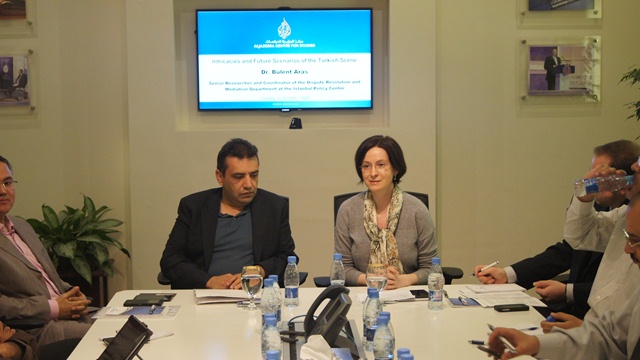
 |
| [AlJazeera] |
Al Jazeera Centre for Studies hosted a roundtable discussion on Tuesday, 21 October 2014, with Dr. Bülent Aras, who is a Senior Researcher and Coordinator of the Dispute Resolution and Mediation Department at the Istanbul Policy Center. He is also the Former Head of the Strategic Research Center at the Turkish Foreign Ministry.
The discussion focused on the geo-politics of the post-Arab Spring, Islamic State (IS) and Turkey. Dr. Aras argued that the regional political atmosphere is more “Arab” than ever, and that the new “Arabness” has been reproduced by a collective consciousness mobilizing the masses in the search for good governance and freedom, that has also been accompanied by a new “Arab-Islam” public sphere.
Addressing a number of researchers from the Studies Cenre and Al Jazeera Network, Dr. Aras said that in geo-political terms, the Arab Spring has challenged the status quo of Arab political geography in two major ways; it has rendered the borders of independent nations meaningless in the Arab world; and it has empowered non-state actors in the region, who are in search of influence and power at the expense of state actors. He argues that this is the emergence of the Islamic State (IS).
In discussing the recent developments in the region – including the possible consequences of a potential downfall of Assad’s regime – Dr. Aras says that although Turkey remains outside the political geography of the Arab Spring, they are still part of the intellectual and political community in the new and unfolding politics of the region. With the exception of Qatar, Turkey does not have many friends within the emerging regional constellation, and would therefore like to garner better alliances with the Arab world in order to deal with the regional problems effectively.
The discussion, moderated by Manuela Paraipan, researcher at the Centre for Studies, ended with several predictions on the future of the Turkey and the Arab world. There are many immediate challenges that lie ahead and it is a matter of time before the new regional system will be identified.